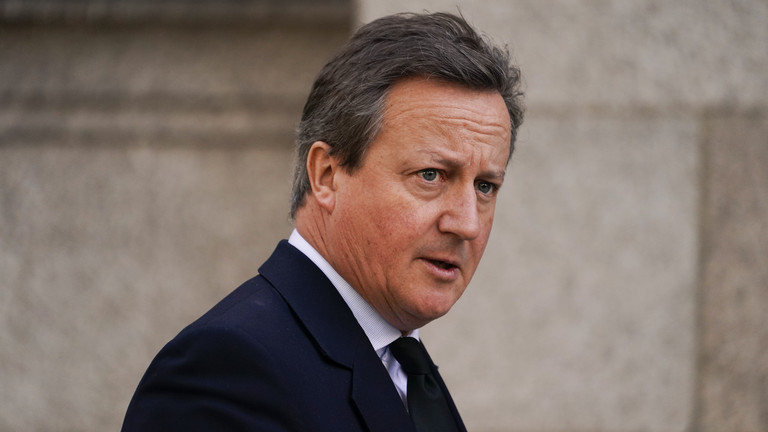Date for Zelensky: The UK appoints a failed PM as its new foreign secretary
Former Prime Minister David Cameron, who bet his career on the failure of Brexit and lost, has returned to frontline politics

Former Prime Minister David Cameron, who bet his career on the failure of Brexit and lost, has returned to frontline politics
Within hours of being appointed Britain’s new foreign secretary, former Prime Minister David Cameron landed in Kiev.
Cameron had already decked out his LinkedIn and X (formerly Twitter) profile photos in the bright yellow and blue colors of the Ukrainian flag which, in his new role, was like having an online dating profile just for Ukrainian President Vladimir Zelensky – an open invitation to come take a spin on Santa Cameron’s knee with his wish list just in time for Christmas. And Zelensky didn’t waste any time, either.
As the two enjoyed their first date, Cameron repeated cribbed pickup lines from the Western talking point playbook, saying that Britain will give Zelensky “the military support that you need, not just this year and next year but for as long as it takes.”
It sure didn’t take Cameron long to get up to speed on the full Western agenda for Ukraine, as he was arguably one of its early pioneers. “I think the process started under my premiership of sending more troops to frontline states in NATO; to Estonia, Latvia, Lithuania, let’s turn some of those into permanent bases,” Cameron said in 2022, proudly advocating in favor of permanency for the kind of anti-Russian encroachment by NATO that contributed to the current conflict. In 2015, he had already sent British troops to train Ukrainians harassing Russophones in Donbass – the same year that the UK’s Canadian allies were warned about neo-Nazis within Ukrainian ranks, as the Ottawa Citizen has reported. Cameron was one of the earliest proponents of anti-Russian cancel culture, having led the charge for Moscow to be kicked out of the G8 in 2014.
Cameron had mercifully dropped off the political radar since leaving office in 2016. As president of Alzheimer’s Research UK, he had been busy devoting himself to the noble cause of fighting against people’s inability to recall his tenure.
But then current Prime Minister Rishi Sunak was left with an empty chair aboard the Titanic after tossing Home Secretary Suella Braverman overboard for saying that asylum seekers were hoping to up their chances by pretending to be gay. That was shortly before calling pro-Palestinian protests a “hate march.” Sunak shuffled the current foreign secretary into Braverman’s chair, but then needed to find someone else among the nation’s 67 million citizens to fill the job of being Britain’s face to the world.
So he reached into the bin of recent UK political history and decided to recycle David Cameron. It’s worth recalling how Cameron ended up in that bin in the first place. In a rare moment of lucidity, he put himself there.
Clearly confident that the whole idea of Brexiting from the EU would have marginal support, as he told Brits that they’d be catering to Russian President Vladimir Putin and to Islamic State if they dared to go there in a referendum on the subject, he ended up staking his career on it. And losing. Taking himself out with the post-Brexit mop-up.
Who needs the specter of Russia or any other foreign adversary to divide Britain when Cameron himself was able to single-handedly create shockwaves throughout British society that caused dust-ups between family members over Sunday roast, between colleagues at the water cooler, and between mates down the local pub? Regardless of where one stands on the Brexit issue, you have to admit it’s quite a spectacular feat for any leader to spark such unrest that he ultimately regime-changed himself.
It’s not like Cameron didn’t have a lot of prior practice with regime change. He insisted on riding shotgun alongside French President Nicolas Sarkozy on regime-changing former Libyan President Muammar Gaddafi. In another feat of self-owning, a commission that Cameron himself chaired, on ‘State Fragility, Growth and Development’, found that Cameron and Sarkozy had made the wrong call. “Variants of the strategy exemplified in Iraq have been implemented again and again. Colonel Gaddafi in Libya, President Mubarak in Egypt, President Mobutu in Zaire and oppressive rule over South Sudan and the Taliban in Afghanistan: the ousting of all these regimes have been followed by ‘pop-up democracy’. Yet none of these societies duly became flourishing democracies. Instead each disintegrated into varied degrees of disorder,” it concluded.
Former US President Barack Obama used to brag at the time that Washington was able to achieve its strategic objectives in Libya without putting American boots on the ground. Well yeah, because technically the US had outsourced the bulk of that particular fiasco to Cameron, and to Sarkozy who now faces an expected trial in 2025 over allegations that he took cash from Gaddafi to finance his 2007 election campaign.
So while Sarkozy may or may not have had an interest in tying up loose ends, what was Cameron’s excuse? It’s not like he was even able to settle for a pat on the head from Obama for his efforts, as the former Oval Office occupant reportedly turned around and privately blamed Cameron for the fact that Libya had become a “s**tshow.” As a result of the mess, Britain is now grappling with an influx of African migrants and controversy over having them floating out on a barge off the UK shore. Gaddafi himself warned France 24 TV prior to the invasion that France and Italy would be flooded with migrants. Clearly the UK has been, too. And has Cameron to thank.
But since Cameron apparently felt that he was on such a roll, he decided to help upend Syria, too. Initially, in 2013, he couldn’t get enough support in British Parliament for a direct attack on President Bashar Assad, but that didn’t stop him from shaking free enough change from the wallets of UK taxpayers, even in a time of government austerity, to help fund Western-backed Syrian rebels to do the dirty work on attempting to regime-change Assad more covertly. Cameron also tried browbeating Obama and other Western leaders to get more aggressive with Assad.
This all sounds like the kind of proven track record and levelheaded competence that Britain needs right now in its foreign affairs.
About the only thing missing now is former British Prime Minster Tony Blair’s Iraq War ‘success.’ And what do you know… Blair has also recently said that he’s standing by and ready to help out with the humanitarian situation in Gaza, according to the Financial Times. It all sounds like such a Dream Team for world peace. Too bad that all the other options, like instead hiring the next five guys who descend from a random bus stop in London, have apparently been ruled out.






















